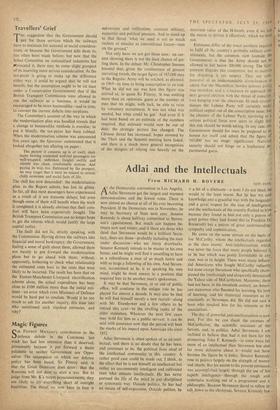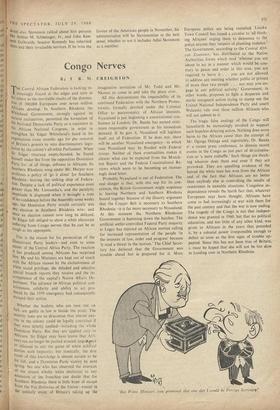Adlai and the Intellectuals
From RICHARD H. ROVERE NEW YORK, AT the Democratic convention in Los Angeles,
A
Adlai Stevenson got the largest and warmest demonstrations and the fewest votes. There is now almost no chance at all of his ever becoming President. If the Democrats win in November, he may be Secretary of State next year. Senator Kennedy is about halfway committed to Steven- son's appointment. But much can happen be- tween now and winter, and if there are those who think that Stevenson would be a brilliant Secre- tary,.there are those—probably including the man under discussion—who see many drawbacks. Senator Kennedy intends to be master in his own house, and he might well find it unsettling to have as a subordinate a man of so much lustre and with so large a following of his own. And Steven- son, accustomed as he is to speaking his own mind, might be most uneasy in a position that required him to be another man's spokesman.
It may be that Stevenson, in or out of public office, will continue in the unique role he has played for almost a decade. It may also be that he will find himself merely a new recruit—along with Mr. Eisenhower and a few others to be retired this year—to the swelling ranks of the elder statesmen. Whatever the next few years may hold for him as a public servant, it can be said with assurance now that the period will bear the marks of his impact upon American life since 1952.
Adlai Stevenson is often spoken of as an intel- lectual, and there is no doubt that he has been, and continues to be, the political beau ideal of the intellectual community in this country. A rather good case could be made out, I think, to the effect that he is not himself an intellectual but rather art uncommonly intelligent and cultivated man who attracts intellectuals. He has never pursued the life of the mind in any disciplined or systematic way. Outside politics, he has had no means of self-expression. Outside politics, he is a bit of a dilettante--a term I do not think hak would in the least resent. But he has wit a id knowledge and a graceful way with the language; and a great respect for the uses of intelligence, and the intellectuals of the country flocked to Fr nv because they found in him not only a patron of great power (they had found this in Franklin Di Roosevelt) but a patron of great understandii gi sympathy and sophistication.
He came on the scene almost on the heels of Joe McCarthy, whom the intellectuals regarded as the class enemy. Anti-intellectualism, which was never the force that many people believed it,, to be but which was pretty formidable in a iyi case, was at its height. There were many influen- tial Americans who fought McCarthy valiantly but none except Stevenson who specifically cham- pioned the intellectuals and eloquently denounced the Yahoo side of McCarthyism. Moreover, there had not been, in the twentieth century, an Ameri- can statesman who flaunted his learning, his love of learning, and his rhetorical resources as in- souciantly as Stevenson did. He did not care a hoot who mosked him for his interests or his associations.
The day of powerful anti-intellectualism is now past. For this we can thank the excesses of McCarthyism. the scientific successes of the Soviets, and, in politics. Adlai Stevenson. I am inclined to believe that had it not been for his pioneering, John F. Kennedy—in some ways far more of an intellectual than Stevenson but also far more defensive about it—would not have become the figure he is today. Senator Kennedy rose in politics largely on the strength of money and charm. But his ascent to his present eminence was accomplished largely through the use of his superb intelligence—through the tough and systematic working out of a programme and a philosophy. Because Stevenson dared to refuse to talk down to the electorate, Senator Kennedy t as dared also. Stevenson rallied about him persons like Arthur M. Schlesinger, Jr., and John Ken- neth Galbraith; Senator Kennedy has inherited them and their invaluable services. If he wins the
favour of the American people in November, his administration will be Stevensonian in the best sense, whether or not it includes Adlai Stevenson as a member.



































 Previous page
Previous page